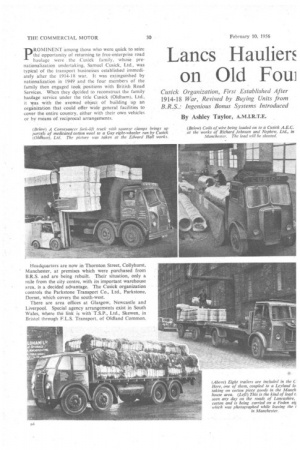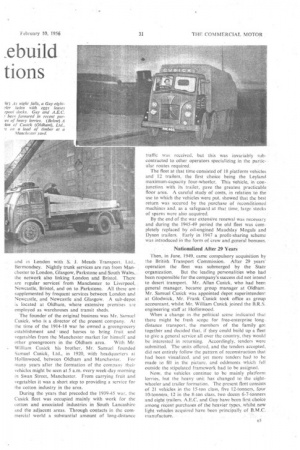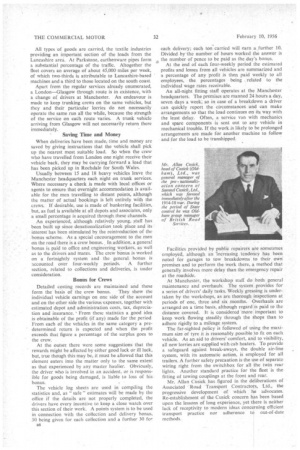Cusick Organization, First Established After 1914-18 War, Revived by Buying
Page 22

Page 23

Page 24

If you've noticed an error in this article please click here to report it so we can fix it.
Units from B.R.S.: Ingenious Bonus Systems Introduced By Ashley Taylor, A.M.I.R.T.E. pROM1NENT among those who were quick to seize the opportunity of returning to free-enterprise road haulage were the .Cusick family, whose prenationalization undertaking, Sarnuel Cusick, Ltd., was typical of the transport businesses established immediately after the 1914-18 war. It was extinguished by nationalization in 1949' and the four members of the family then engaged took positions with British Road Services. When they dvcided to reconstruct the family haulage service under the title Cusick (Oldham), Ltd., it was withthe avowed object of building up an organization that could offer wide general facilities to cover the entire country, either with their own vehicles or by means of reciprocal arrangements.
Headquarters are now in Thornton Street, Collyhurst, Manchester, at premises which were purchased from B.R.S. and are being rebuilt. Their situation, only a mile from the city centre, with its important warehouse area, is a decided advantage. The Cusick organization controls the Parkstone Transport Co., Ltd., Parkstone, Dorset, which covers the south-west.
There are area offices at Glasgow, Newcastle and Liverpool. Special agency arrangements exist in South Wales, where the link is with T.S.P., Ltd., Skewen, in Bristol through F.L.S. Transport, of Oldland Common.
and in London with _S. J. Meads Transport, Ltd., Bermondsey. Nightly trunk services are,run from Manchester to London, Glasgow, Parkstone and-SoUth Wales, the network also linking London arid .Bristol. There are regular services-. frOrn Manchester to Liverpool, Newcastle, • Bristol, and on to.ParkStOne. All these:are supplemented by frequent • services between London and Newcastle, and Newcastle and _Glasgow. . A sub-depot is located at Oldham, .where extensive premises are employed as warehouses and transit sheds.
The founder-of the original business was Mr. Samuel Cusick, who is a director of the present company. At the time of the 1914-18 war he owned a greengrocery establishment and used horses to bring fruit and vegetables from the Manchester market for himself and
other greengrocers in the Oldham area. With Mr. William Cusick his brother, Mr. Samuel founded Samuel Cusick, Ltd., in 1920, with headquarters at Hollinwood, between Oldham and Manchester. For many years after the formation of the company their vehicles might be seen at 5 a.m. every week-day morning in Swan Street, Manchester. From carrying fruit and vegetables it was a short step to providing a service for the cotton industry in the area.
During the years that preceded the 1939-45 war, the Cusick fleet was occupied mainly with work for the cotton and associated industries in South Lancashire and the adjacent areas. Through contacts in the commercial world a substantial amount of long-distance
traffic was received, but this was invariably subcontracted to other operators specializing in the particular routes required.
The fleet at that time consisted of 18.platform vehicles and 12 trailers, • the first choice being the Leyland maximum-capacity four-wheeler. This vehicle, in.conjunction with its trailer, gave the greatest practicable floor area. A careful study of costs, in relation -to the use to Which the vehicles were put, showed that the best return was secured by the purchase of reconditioned machines and, as a safeguard at that time, large stocks of spares were also acquired.
By the end of the war extensive renewal was necessary and during the 1945-49 period the old fleet was Completely replaced by oil-engined Maudslay Moguls and Dyson trailers. Early in 1947 a -profit-sharing scheme was introduced in the form of Crew and general bonuses. •
Nationalized After .29 Yeats Then, in Tune, 1949, came compulsory acquisition by the British Transport Commission. After 29 years' operation the fleet was submerged by the State organization. But the leading personalities who had been responsible for the company's success did not intend • to desert transport. Mr. Allan Cusick, who had been general manager, became group manager at Oldham. Mr. Samuel Cusick was appointed depot superintendent at Glodwick, Mr. Frank Cusick took office as group accountant, whilst Mr. William Cusick joined the B.R.S. engineering staff at Hollinwood.
When a change in the political scene indicated that there might he fresh scope for free-enterprise longdistance transport, the members of the family got together and decided that, if they could build up a fleet to give a general service all over the country, they would be interested in returning. Accordingly, tenders were submitted. The units offered, and the tenders accepted, did not entirely follow the pattern of reconstruction that had been visualized, and yet more tenders had to be made to fill in the picture, and oddments which fell outside the stipulated framework had to be assigned.
Now, the vehicles continue to be mainly platform lorries, but the heavy unit has changed to the eightwheeler and trailer formation. The present fleet consists of 21 vehicles in the 15-ton class, five 12-tonners, four 10-tonners, 12 in the 8-ton class, two dozen 6-7-tormers and eight trailers. A.E.C. and Guy have been first choice among recent purchases of the heavier types,.vvhilst new light vehicles acquired have been principally of B.M.C. rnanufactui-e,
All types of goods are carried, the textile industries providing an important section of the toads from the Lancashire area. At Parkstone, earthenware pipes form a substantial percentage of the traffic. Altogether the fleet covers an average of about 45,000 miles per week, of which two-thirds is attributable to Lancashire-based machines and a third to those located on the south coast.
Apart from the regular services already enumerated, a London—Glasgow through route is in existence, with a change of drivers at Manchester. An endeavour is made to keep trunking crews on the same vehicles, but they and their particular lorries do not necessarily operate the same run all the while, because the strength of the service on each route varies. A trunk vehicle arriving from Glasgow will not necessarily return there immediately.
Saving Time and Money
When deliveries have been made, time and money arc saved by giving instructions that the vehicle shall pick up the nearest most suitable load. So when the crew who have travelled from London one night receive their vehicle back, they may be carrying forward a load that has been picked up in Rochdale for South Wales.
Usually between 15 and 18 heavy vehicles leave the Manchester headquarters each night on trunk services. Where necessary a check is made with local offices or agents to ensure that overnight accommodation is available for the men travelling to distant points, although the matter of actual bookings is left entirely with the crews.' If desirable, usc is made of bunkering facilities, but, as fuel is available at all depots and associates, only a small percentage is acquired through these channels.
An experienced, although relatively young, staff has been built up since denationalization, took place and its interest has been stimulated by the reintroduction of the bonus scheme. As a special encouragement to the men on the road there is a crew bonus.. In addition, a general bonus is paid to office and engineering workers, as well as to the drivers and mates. The crew bonus is worked on a fortnightly system and the general, bonus is accounted over four-weekly periods. A further section, related to collections and deliveries, is under consideration.
Bonus for Crews Detailed costing records are maintained and these form the basis of the crew bonus. They show the individual vehicle earnings on one side of the account and on the other side the various -expenses, together with estimated depot and administration costs, tax, depreciation and insurance. • From these statistics a good idea is obtainable of the profit (if any) made for the period From each of the vehicles in the same category a predetermined return is expected and when the profit exceeds that figure a percentage of the surplus goes to the crew.
At the outset there were some suggestions that the rewards might be affected by either good luck or ill luck, but, true though this may be, it must be allowed that this element enters into the matter only to the same extent as that experienced by any master haulier. Obviously, the driver who is involved in an accident, or is responsible for goods being damaged, is liable to loss of his bonus.
The vehicle log sheets are used in compiling the statistics and, as " safe " estimates will be made by the office if the details are not properly completed, the drivers have every incentive to keep a close watch over this section of their work. A points system is to be used in connection with the collection and delivery bonus, 30 being given for each collection and a further 30 for B6 each delivery; each ton' carried will earn a,further 10. Divided by the number of hours worked the answer is the number of pence to be paid as the day's bonus, At the end of each four-weekly period the estimated profits and losses from all vehicles are summarized and a percentage of any profit is then paid weekly to all employees, the percentages being related to the individual wage rates receivable.
An all-night fitting staff operates at the Manchester headquarters. The premises are manned 24 hours a day, seven days a week; so in case of a breakdown a driver can quickly report the circumstances and can make arrangements so that the load continues on its way with the least delay. Often, a service van with mechanics and spare components is sent out to any vehicle in mechanical trouble. If the work.is likely to be prolonged arrangements are made for another machine to follow and for the load to be transhipped.
Facilities provided by public repairers are sometimes employed, although an Increasing tendency has been noted for garages to tow breakdowns to their own premises and to perform the work there, a method that generally involves more delay than the emergency repair at the roadside.
At Manchester, the workshop staff do both general maintenance and overhauls. The system provides for a series of drivers' daily tasks. Weekly greasing is undertaken by the workshops, as are thorough inspections at periods of one, three and six months. Overhauls are arranged on a time basis, although regard is paid to the distance covered. It is considered -more important to keep work flowing steadily through the shops than to adhere rigidly to a mileage system.
The far-sighted policy is followed of using the maximum size of tyre it is reasonably possible to fit on each vehicle. As an aid to drivers' comfort, and to visibility, all new lorries are supplied with cab heaters. To provide a safeguard against break-aways, the double air-line system, with its automatic action, is employed for all trailers. A further safety precaution is the use of separate wiring right from the switchbox for all the twin rear lights. Another standard practice for the fleet is the fitting of towing couplings at the front and rear.
Mr. Allan Cusick has figured in the deliberations of Associated Road Transport Contractors, Ltd., the progressive development of which he advocates. Re-establishment of the Cusick concern has been based upon the lessons of long experience, yet there is neither lack of receptivity to modern ideas concerning efficient transport practice nor adherence to out-of-date methods.












































